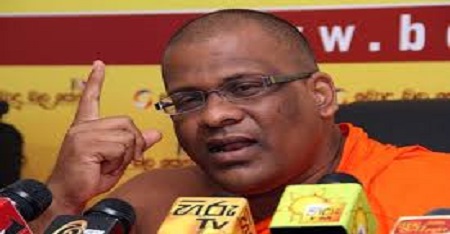Less than a decade since the civil war ended, another ethnic conflict is erupting in this island nation. Neville de Silva reports.
The following report orginally appeared in Asian Affairs
Since the early 1970s, Sri Lanka has faced two insurgencies by majority Sinhala youth in the south and a near 30-year war by minority Tamil secessionists in the predominantly Tamil northeast.
The latter ended in the military defeat of the separatist Liberation Tigers of Tamil Eelam (LTTE) a little over eight years ago. There are conflicting estimates of the numbers killed and maimed in these social and ethnic upheavals, which tore the country apart and devastated the economy, but it is said to be around half a million.
Yet in the post-LTTE war years, governments and national leaders paid scant attention to rising bubbles of discontent, reneging on promises they made to the people and the international community to clamp down on those fomenting ethnic tensions and to punish the hate-mongers.
‘Never again will there be such racial conflicts,’ was the pious but ultimately empty vow of both the previous Rajapaksa government and the current administration of President Maithripala Sirisena and Prime Minister Ranil Wickremesinghe.
While progress towards ethnic reconciliation between the Sinhala and Tamil communities has been tardy, a more recent phenomenon has been the targeting of Muslims, Sri Lanka’s third largest ethnic group, comprising around 9 per cent of the country’s population of 21 million. Since April 17 this year, more than 20 incidents, including assaults on Muslim businesses and petrol bomb attacks on mosques, have been reported from different parts of the country.
In an unexpected development, on June 1 the diplomatic community, including the UN chief in Colombo, ambassador of the European Union and heads of missions from countries including Canada and Australia, condemned the violence against Muslims and urged the government to act.
‘It is important that the rule of law be applied against those perpetrators and that minority rights and freedom of religion are upheld,’ Canadian high commissioner Shelley Whiting told journalists.
This very public intervention by the diplomatic community, especially the involvement of western countries, including those in the EU which the present government is assiduously cultivating for diplomatic and investment support, galvanized an administration previously more intent on tackling internal squabbles. Sirisena and Wickremesinghe ordered the police to uphold the law and, in a statement, the cabinet condemned hate speech and hate crimes which threaten to once again set the country alight.
Yet they continue. Curiously, one of the perpetrators of the recent violence, a Buddhist monk, is still at large, despite the hundreds of police deployed to trace him. They have returned empty-handed and he, it seems, is enjoying his impunity.
 Galagoda Aththe Gnanasara leads one of Sri Lanka’s most extreme Sinhalese Buddhist nationalist organisations, the Bodu Bala Sena (BBS), or Buddhist Power Force, which regards the spread of Islam as a threat to Buddhism as the country’s dominant religion. The public face of the BBS, Gnanasara is not averse to propagating hate speech and hate crimes, mirroring events in Myanmar.
Galagoda Aththe Gnanasara leads one of Sri Lanka’s most extreme Sinhalese Buddhist nationalist organisations, the Bodu Bala Sena (BBS), or Buddhist Power Force, which regards the spread of Islam as a threat to Buddhism as the country’s dominant religion. The public face of the BBS, Gnanasara is not averse to propagating hate speech and hate crimes, mirroring events in Myanmar.
Many Buddhists avoid calling the monk venerable for obvious reasons. His emergence in or around 2012, with demonstrations against certain Muslim cultural traditions, provided a platform for his anti-Muslim views to break into the open. And he is not alone. There are other extremist Buddhist groups which, like the BBS, stir up hatred and undermine the most fundamental of the Buddha’s teachings such as tolerance and non-violence.
The 2014 BBS-led attacks on Muslims and their business establishments in popular south-western tourist towns such as Aluthgama and Beruwala, in which three Muslims were killed and some 75 injured, were the worst clashes up till then.
In the post-LTTE war years, governments and national leaders paid scant attention to rising bubbles of discontent
The widely-held belief that Gnanasara is being protected by a powerful minister was confirmed by the recent remarks of a cabinet spokesman. Naturally the news spread quickly and the guessing game began.
If the minister has been identified by some cabinet colleagues, as appears to be the case, why, Sri Lankans are asking, can Gnanasara not be arrested? Orders to detain him have come from the heads of the executive and the courts, which have issued two arrest warrants for the monk. The first was for barging into court and threatening judges and prosecuting lawyers, but he has never appeared in court on that charge.
Another warrant was issued recently but Gnanasara seems to be in some safe house beyond the reach of the law. As happened under the Rajapaksa regime, it looks as though some deity is protecting him, making him untouchable.
Neville de Silva is a veteran Sri Lankan journalist who worked in Hong Kong for many years in senior roles at The Standard and in London for Gemini News Service. He has been a correspondent for the New York Times, Christian Science Monitor, The Guardian, Le Monde, Asian Wall Street Journal, AFP and other foreign media. More recently he was Sri Lanka’s deputy high commissioner in London.
Leave Comments